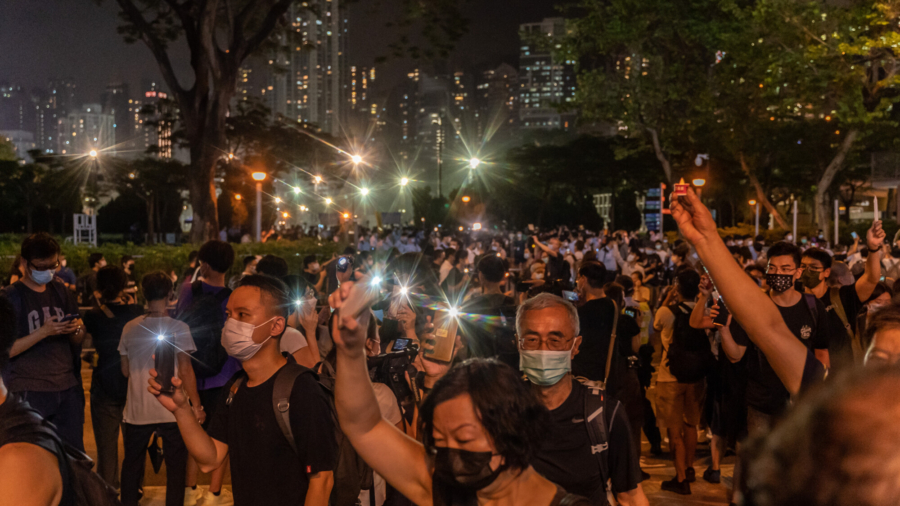HONG KONG—Hundreds of people gathered near a Hong Kong park on June 4 despite a ban on an annual candlelight vigil to remember the Chinese regime’s deadly Tiananmen Square massacre, and the arrest earlier in the day of an organizer of previous vigils.
Hong Kong police banned the vigil for a second straight year, citing coronavirus social distancing restrictions, although there have been no local cases in the semi-autonomous Chinese city for about six weeks.
Police closed off parts of Victoria Park—the venue of past vigils—in the city’s Causeway Bay shopping district and warned people not to participate in unauthorized assemblies, under threat of up to five years imprisonment.
Despite the ban and a heavy police presence, hundreds of people showed up Friday night to walk along the park’s perimeter.

Many illuminated the flashlights on their smartphones while others lit candles in remembrance of the estimated 10,000 who lost their lives when the Chinese military massacred student-led pro-democracy protests in Beijing at Tiananmen Square on June 4, 1989.
In past years, tens of thousands of people have gathered in Victoria Park to honor the dead. Thousands attended last year despite the ban, lighting candles and singing songs. Police later charged more than 20 activists with participating in the event.
Edward Yeung, one of those participating in Friday night’s event, flicked on a lighter instead of a candle and said authorities are “scared of the people.”
“They’re scared that people will remember all this. They want to wash it all away,” he said.
The (Chinese Communist Party) CCP has never allowed public events on the mainland to mark the anniversary and security was increased at the Beijing square, with police checking pedestrians’ IDs as tour buses shuttled Chinese tourists in and out.

Efforts to suppress public memory of the Tiananmen events have lately turned to Hong Kong. Apart from the vigil ban, a temporary June 4 museum closed after a visit from authorities earlier this week.
The efforts came amid sweeping moves to quell dissent in the city due to a new national security law, election system changes, and the arrest of many activists who participated in pro-democracy protests that swept Hong Kong in 2019.
Earlier Friday, police arrested Chow Hang Tung, a vice chair of the Hong Kong Alliance that organized Hong Kong’s annual candlelight vigil, the group said.
Although police did not identify Chow, they said they arrested a 36-year-old woman from the Hong Kong Alliance as she was publicizing an unauthorized assembly via social media despite the police ban on the vigil.
After the ban was issued, Chow urged people to commemorate the event privately by lighting candles wherever they are.
Chow, a lawyer, said in an earlier interview with The Associated Press that she expected to be jailed.

“I’m already being persecuted for participating and inciting last year’s candlelight vigil,” she said. “If I continue my activism in pushing for democracy in Hong Kong and China, surely they will come after me at some point, so it’s sort of expected.”
Two other key members of the Hong Kong Alliance, Lee Cheuk-yan and Albert Ho, are behind bars for joining unauthorized assemblies during the 2019 protests.
At the University of Hong Kong on Friday afternoon, students took part in an annual washing of the “Pillar of Shame” sculpture, which was erected to remember the victims of the Tiananmen massacre.
“In cleaning the Pillar of Shame, we shall learn how our predecessors defended the freedom of expression before, and we shall not easily give up,” said Charles Kwok, the president of the students’ union.
Some gathered in churches Friday night to mark June 4 and pray for the victims.
Clare Ho, a postgraduate student, said she participated in previous vigils but decided to attend Mass this year to pray for the victims because the vigil was banned.

“I feel like the least I can do as a Hongkonger, and as a Catholic, I just feel like coming here to pray for them is something I should do,” she said.
The government made no response to an appeal from Tiananmen Mothers, published on the Human Rights in China website, urging the party to release official records about the massacre, provide compensation for those killed and injured, and hold those responsible to account.
Tiananmen Mothers said many young Chinese have “grown up in a false sense of prosperous jubilance and enforced glorification of the government [and] have no idea of, or refuse to believe, what happened on June 4, 1989.”
The suppression of the Tiananmen commemorations has been accompanied in recent years by harsh repression of religious and ethnic minorities in Tibet, the northwestern region of Xinjiang, and Inner Mongolia, along with the sharp curtailing of political rights in Hong Kong.

“China’s authoritarian regime has used another kind of force, enforced amnesia, in its attempts to bury the truth of the brutal crimes it committed against its people,” Human Rights in China said in a statement.
In Taiwan, activists who host an annual Tiananmen memorial moved mostly online as the island faces its worst outbreak of the coronavirus since the pandemic began. A temporary memorial pavilion was set up in Taipei for people to leave flowers and other mementos.
The U.S. State Department issued a statement of support for those advocating for victims and pursuing the truth.
“We must never stop seeking transparency on the events of that day, including a full accounting of all those killed, detained, or missing,” the statement said.


